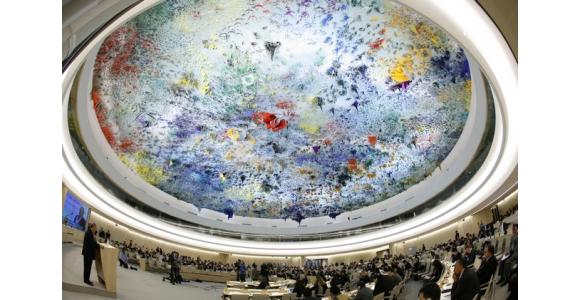In the UN Human Rights Council: Nazra for Feminist Studies Criticizes the Egyptian State’s Treatment of Women Human Rights Defenders
Press Release
The Military Regime does not Welcome Women’s Public Action and Defends Abuses on the Basis of Moral Justifications.
Nazra for Feminist Studies participated in the proceedings of the 19th session of the UN Human Rights Council, which opened on February 27 and will close on March 23; as well as several seminars held on the sidelines of the session at the council’s headquarters in Geneva, Switzerland.
Nazra for Feminist Studies submitted, along with the Cairo Institute for Human Rights Studies (CIHRS), a written intervention to the council on the situation of women human rights defenders in Egypt and the nature of abuses committed against them under the rule of the Supreme Council of the Armed Forces (SCAF). The violations committed under the rule of the SCAF are seen as a perpetuation of policies and practices inherited from the Mubarak regime. The intervention was presented after Margaret Sekaggya, the UN special rapporteur on the situation of human rights defenders, submitted her fourth report to the Human Rights Council.
In addition to the written intervention, Yara Sallam, the director of Nazra’s women human rights defenders program, spoke in a side event organized by the CIHRS entitled, “Egypt: A Year of Military Rule,” in which she addressed the challenges faced by women human rights defenders and the attempts by state authorities to exclude women from the public sphere. Yara argued that “since the beginning of the revolution, women have challenged social stereotypes and prevailing traditions about women’s roles. Clearly the regime in Egypt does not welcome women’s presence and action in the public sphere. Repression and abuses of women are justified using moral judgments while ignoring the basic rights and liberties of women,” adding that “democracy will not be built on women’s bodies, and the revolution will not succeed without respecting women and integrating their issues into the struggle to end military rule and dictatorship.”
Salma El-Naqqash, Nazra’s project coordinator, participated in another side event organized by the International Federation for Human Rights (FIDH) entitled, “Women and the Arab Spring: Partners in the Revolution, Equal in Transition?” Salma spoke about the rising violence against women and the negative impact of the military regime on the status of women human rights defenders in Egypt. “The women who took part in the revolution aim to achieve a better future for themselves and their families,” she said. “The greatest danger facing them now is militarization. We have seen increased violence against women, starting with the virginity tests in March 2011 and up to the targeting of women in December 2011, including the incident of the girl with the blue bra. These women do not call themselves feminists or women’s rights activists, but they are nevertheless contributing greatly to the women’s movement in Egypt.” El-Naqqash added, “After the early days of the revolution and Mubarak’s ouster, it became clear that women were being targeted by Interior Ministry forces and the military police.”
To read the written intervention, click here.


